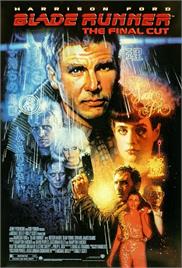Be Careful of Fake Websites. Always use HindiMovies.to domain & Join our Telegram Channel for Latest Updates.

Likes: 5
Views: 3.38K
In a cyberpunk vision of the future, man has developed the technology to create replicants, human clones used to serve in the colonies outside Earth but with fixed lifespans. In Los Angeles, 2019, Deckard is a Blade Runner, a cop who specializes in terminating replicants. Originally in retirement, he is forced to re-enter the force when four replicants escape from an off-world colony to Earth.
Duration: 117 min
Released: 1982
IMDb Rating: 8.2/10 (383,962 Votes)
Genre: Dubbed Movies, Sci-Fi, Thriller
Stars: Rutger Hauer, Harrison Ford, Sean Young, Edward James Olmos
Directors: Ridley Scott
Writers: Philip K. Dick, Hampton Fancher, David Webb Peoples
Year: 1982
Server 1 – Openload
Server 2 – Streamango
Server 3 – Vidto
Server 4 – Vidzi
Server 5 – Watchers
Blade Runner (1982): A Timeless Sci-Fi Thriller
Blade Runner, directed by Ridley Scott and released in 1982, has rightfully earned its place as a masterpiece in the science fiction and thriller genres. This film combines a dystopian future with deep philosophical questions about humanity, identity, and existence, making it a landmark in cinematic history.
Plot Summary
Set in a grim, rain-soaked Los Angeles in the year 2019, Blade Runner explores a dark future where humans create bioengineered beings known as replicants. These replicants are almost indistinguishable from real humans but possess superior strength and agility and are used for dangerous and menial work, often off Earth.
The story follows Rick Deckard (played by Harrison Ford), an ex-police officer and former blade runner, who is tasked with hunting down and "retiring" a group of renegade replicants led by Roy Batty. These replicants have returned illegally to Earth in search of extending their limited lifespans. As Deckard pursues them, he is forced to question what it truly means to be human, especially as he develops complex feelings toward Rachael (Sean Young), a replicant with implanted memories.
Main Cast
Director and Writer
Blade Runner was masterfully directed by Ridley Scott, who had previously made a monumental impact with films like Alien. His vision brought the dark, atmospheric future Los Angeles to vivid life with stunning visuals and an immersive noir style that would influence sci-fi cinema for decades.
The screenplay was written by Hampton Fancher and David Peoples, based on Philip K. Dick's 1968 novel Do Androids Dream of Electric Sheep? Fancher initially adapted the novel’s core themes, and Peoples contributed significantly to the film’s darker and more philosophical elements. Their combined writing forged a screenplay that elevates the story beyond a mere futuristic thriller to a meditation on humanity.
Visual and Music Elements
Blade Runner's visual style is a groundbreaking blend of film noir and cyberpunk aesthetics. Ridley Scott’s direction was complemented by the production design of Lawrence G. Paull and the haunting cinematography of Jordan Cronenweth. The rain-soaked streets, neon advertisements, dark alleys, and towering skyscrapers create an immersive world that feels both alien and strangely familiar.
Complementing the visuals, the film features a pioneering electronic score composed by Vangelis. The music blends synthesizers with ethereal melodies to create an atmospheric and emotional soundscape that perfectly matches the tone of the film. This soundtrack has become iconic in the world of sci-fi cinema and continues to resonate with fans worldwide.
Thematic Depth
Blade Runner is more than an action-packed thriller; it probes deep philosophical questions. Themes of identity, memory, and what it means to be human are explored through its characters, especially with the complex portrayal of replicants as sentient beings capable of emotions and desires. The film’s ambiguous ending and moral dilemmas leave viewers contemplating long after the credits roll.
Cultural Impact and Legacy
Though not an immediate box office hit upon release, Blade Runner grew in stature over the years to become a cult classic. It pushed the boundaries of special effects and storytelling in science fiction, influencing countless films, books, video games, and more.
Notably, Rutger Hauer’s improvised "Tears in Rain" monologue remains one of the most memorable moments in film history. The movie's exploration of artificial intelligence continues to inspire discussions about technology's role in society.
Multiple versions of the film exist, including the theatrical cut, director’s cut, and final cut, each adding layers and clarifications to the narrative, allowing audiences to engage with the story in unique ways.
Conclusion
Blade Runner (1982) stands as a cinematic milestone that expertly blends thrilling storytelling with profound philosophical questions. With outstanding performances by Harrison Ford, Rutger Hauer, and Sean Young, visionary direction by Ridley Scott, and a haunting Vangelis score, it remains a must-watch for lovers of science fiction and cinema in general. Its enduring influence and thought-provoking narrative continue to captivate and challenge audiences around the globe.